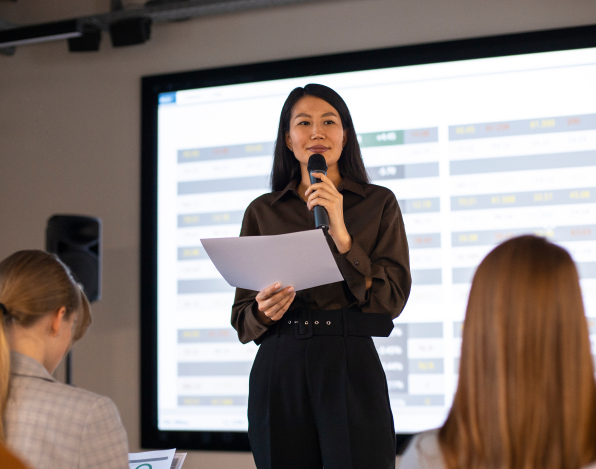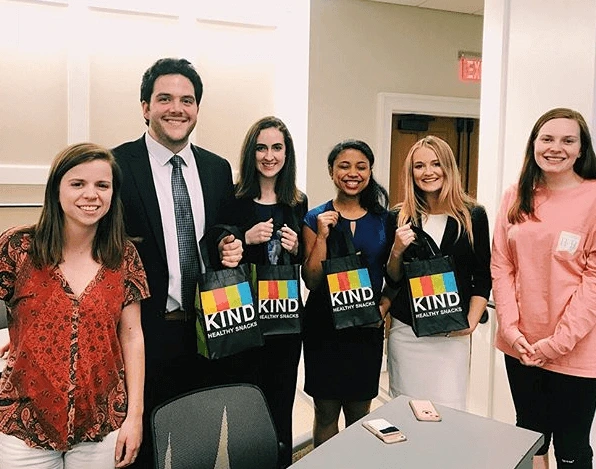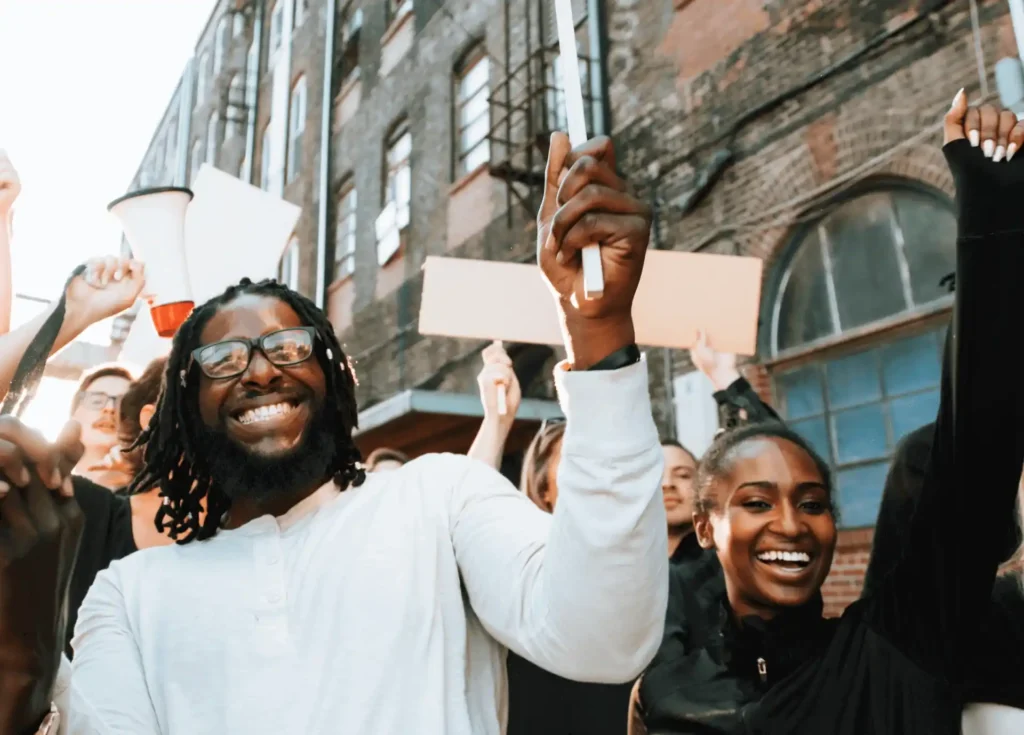By Royce Johnson
AMA New York Volunteer
Becoming an authority in conversational marketing is a daunting task, perhaps more so for women in marketing. Young Mi Park, adjunct lecturer at Columbia University and Rutgers Business School, spoke to Jennifer Consaga, Senior Digital Marketing Manager at Smartling, about leveraging her own voice. Conversational Marketing has gone global through building relationships and creating leads that come from personalized experiences. Jennifer suggested first to women in marketing, to focus on being authentic. Jenn also talked about her journey as a digital marketer and the skills she learned along the way, and provided thoughtful advice both for young women interested in marketing and those established in their careers.
Transcript:
00:26 Shirley Chisholm said, “If they don’t give you a seat at the table, bring a folding chair.” Take Your Seat At The Table celebrates the accomplishments of women in marketing at various stages in their careers. In this series, we will introduce you to marketing trailblazers from a variety of industries. These are extraordinary women who are strategically navigating their success and overcoming challenges, or making their mark and paving the way for future leaders. Today, we’re joined by Jennifer Consaga, Senior Digital Marketing Manager at Smartling, where she is quickly becoming an authority in Conversational Marketing and leveraging her own voice. Hosted by Young Mi Park, an expert in strategic marketing and executive leadership, let’s listen as Jenn Consaga takes her seat at the table.
01:26 How are you doing today, Jenn?
01:28 I’m doing well. How are you Young Mi?
01:30 I’m fine, thanks. Let’s start off by just giving us a brief introduction of who you are.
01:39 Absolutely. My name’s Jenn, I’m the senior digital marketing manager at Smartling, been here about nine months and really enjoying the job. I’m learning a lot. I’m originally from Maine, found myself in Florida for school, made my way back up North and I’m now in New York around six and a half years. Enjoy the outdoors, working out, cooking… anything art or music related. Those two things really inspire me.
02:17 When you came up to New York, was that for a job in marketing or advertising?
02:23 It was actually for a job in fashion, that I first landed in New York. I actually was doing advertising tours. In college I was a part of this group called the advertising society and so we would all come up as a group and then tour different agencies and see what agency life was like. To be honest, it was difficult to get a job in advertising right away. So, I scoured my network and was able to get a position as a stylist at Ralph Lauren, which got me to New York. It helped pay a portion of the rent and then, yeah, I didn’t stay there too long. Honestly, I really wanted to get into advertising so while I was there, I was also looking for jobs in the industry.
03:17 How did you make your way to advertising then?
03:21 I was browsing Facebook. I’m a member of this group that connects skaters, and there was a posting for an assistant account executive position at this agency called Arnold. I reached out to somebody who also happened to be a Gator who was working there, handed in my resume, he’s like “Great, I will see if the hiring team is interested and get back to you.” That definitely helped having that connection. I interviewed for the position and I ended up getting it. I was working on the Hershey account at the time.
04:03 How did you like that?
04:05 Having not spent any time truly in the workforce, you know, going from college to the real world, you have these expectations that you’re going to roll up into the industry and just take the world by storm and be the person leading creative presentations in front of the clients, and it’s just a rude awakening. Maybe I watched too much Mad Men at the time, but you kind of know, you’re the lowest on the totem pole. I spent more time in Excel than I did in any board room and I had to learn very quickly that my role there was to be a sponge, and to listen, and to ask questions. It wasn’t to “run the room”, so to say. It was to learn and to support the team. So that was definitely unexpected, but it was a great lesson, because when you go from college to the real world, you’re not always prepared to have to kind of take a step back, push your ego aside, and be a sponge…which is critical when you first start out.
05:30 It’s kind of interesting that you entered the workforce, just ready to speak up, because I think a lot of the new hires and especially young women, that’s something that they find a little bit challenging to do and it’s harder even as they develop further in their careers. So, would you say that you’ve discovered your voice at a certain point along the way? Or are you still in that listening mode? Where are you now?
06:08 I think I’m always in listening mode. There’s always a learning opportunity, but I also recognize that if you don’t use your voice, how will you be noticed? Using your voice can be asking a question. Using your voice can also just be speaking up, and providing a different point of view. I think that when I was first starting out, I was still developing that voice. But now, because of having more experience under my belt, I can use my voice in a way that provides more meaning, and I would say for women, if they are scared to speak up, just try. It’ll become less scary just by putting yourself out there. The first time is obviously going to be difficult, but you can’t grow and you can’t learn if you don’t put yourself out there.
07:17 Tell us about an experience that maybe helped you understand how to use your voice.
07:27 One day, I was packing up boxes for an event that we had. Also, I was stuffing envelopes for a direct mail order, and I’m sitting back, and I’m getting frustrated. I’m like, “I could be doing so much more, why am I just doing this?” And so, I calmed down, took a moment to collect myself and figure out what it was that I wanted to accomplish by having a direct conversation with my manager about being able to do more. So, I went to him and I was like, “There’s so much more that I’m capable of, and I would like to prove to you, and show you that I can add a lot more value to this organization and into this team.” And he was like, “Oh, okay great. Now, what is it that you’re looking to do?” And we were using HubSpot at the time, a marketing automation tool, and I was like, “I want to learn HubSpot and I want to run it one day at this company.” And he was like “Okay, well that’s great. Let’s get you signed up for a class.” And that opportunity wouldn’t have come to me had I not spoken up.
08:36 How did you end up at Smartling?
08:40 I was browsing on Built In, this online job listing. I saw Smartling, just kind of on a whim, applied. Got an interview and showed up. It started off with a phone interview, then I met in person with a couple of folks, and then I met my former manager, Ani. She was just so easy to talk to. We had a lovely conversation. We talked about obviously job requirements, but also on a personal level, we really connected. I realized in that moment, whether I got the job or I didn’t, I wanted to work with somebody like that. Report to a manager that I knew I could learn from…who would kind of look out for me and provide learning opportunities. Luckily I got the position and I still tell Ani to this day, she’s the reason I decided to switch or move over to Smartling, because it was her leadership style that I recognized during the interview process that really drew me in.
9:58 What is the best career advice that you’ve received?
10:03 The first is from my roommate, my first roommate in New York, also named Jen and who’s also in advertising. She said to me to always take an interview, that was not to say to jump around and not stick at a place for too long. She just meant it as that’s an opportunity for you to get experience interviewing, also to make new connections. The second thing I actually picked up on from this book that I recommend everybody read who’s starting out called The Defining Decade. A piece of advice in that book was that there’s strength in weak ties. That’s to say that regardless of how well you know somebody, whether they’re your best friend or an acquaintance, there’s strength in that relationship, and it’s important to lean on your connections to help you navigate your career.
11:05 What is one mistake that you’ve seen other women making in their careers?
11:10 I would say, not asking for a raise. It’s a difficult conversation to have, but it’s an important one. I am not super vocal about it, not a nag right about getting a raise, but it’s important to have that conversation and take control of that conversation. In my experience, I haven’t seen women do that often enough. For me, I have no problem going to my boss and saying “Hey, I’m contributing to the organization and my level of responsibility has increased. I think it’s time that we discuss compensation.” I could be met with a no, or I could also be met with a yes. If I didn’t have that conversation already, I’d have shut that door. And even if I am met with a no, my response to that is “Okay, not yet. Gotcha. We’ll talk again in six months.”
12:18 That’s great. Now I’m going to ask you two questions that are a little bit polar opposites. So, one is: Has there been a defining moment in your career so far? And then the opposite question is: If you were to go back — and maybe the answer is the same to both of them — that’s possible too. But, if you were to go back in time and had the ability to change the way that you approached a certain career decision, what would you have done differently?
12:50 I would say, when I decided to make the switch from advertising to marketing. At the time, I was really unsure of the decision. I had to take a downgrade in title, had to take a downgrade in compensation. I was kind of like “Does this actually make sense to do that?” Hindsight is a beautiful thing and I’m so happy I did that at the time. It felt like I was possibly misstepping, but it helped me get to where I am in my career now and develop additional skills that I now couldn’t imagine not having in my arsenal. So, definitely a defining moment. I was kind of at this crossroads: Do I continue doing what I’m doing? Or, do I take a minute, reevaluate, and then take a step back to move forward? I would do that 10 times over! It was one of the best decisions, probably the best decision I’ve made in my career.
14:13 What makes you happier?
14:15 There’s a lot more challenge and I also get to wear a lot more hats. When I was in advertising, I was on the account team and that’s where you liaise between the client and then all internal teams. Now I’m a digital marketer, I am helping out with demand generation, I put on my production hat when we have to make little videos, sometimes I play designer, social media manager. I get to wear so many hats now, and I absolutely love that. That makes me happy. There’s never a day that goes by that I’m not learning and having that ability to try different things. To learn new skill sets is something that I really love about this chosen career path.
15:22 That’s great. That’s great. What’s your favorite thing to do outside of work?
15:27 Favorite thing? Yes, I would say my dog. I have a six-month-old GoldenDoodle, and she’s a little whack job, but I love her. Teddy Spaghetti, I love being outside with her, and just watching her observe the world. I also love painting. I’m not a fantastic painter, but I enjoy it. I have some canvases and I enjoy doodling with acrylics. I also am definitely more spontaneous in my personal life. One day I was looking around my space, were spending a lot more time indoors now, in our homes, with COVID and I was like, “The walls are boring and we need color on the walls.” So I went to the local ACE Hardware and found a color that seemed like it would work. I didn’t test it out; it took me all of a second to pick out what color would be on our walls and I painted them, did the same thing in our bedroom. I like to add more color to our space, whether it’s, you know, painting the walls, buying plants, getting new furniture.
16:46 Let’s step back and take a look at marketing overall. Marketing changes pretty quickly, a lot has happened to propel those changes on. Tell us about a change that you’ve experienced and how have you navigated it.
17:04 That’s a great question. I don’t know if this is necessarily a shift in marketing overall, but when I went from my last company to Smartling, one thing that has been ingrained in me is this idea of Conversational Marketing. The term was actually coined by Drift, but it’s this whole idea that B2B doesn’t have to be boring or robotic. As a brand, we can speak with our prospects like they’re humans. So, that was a definite shift in mindset and it also had an impact on my work. So if I’m developing website copy, have fun with it! The people that are reading it are humans like you and I, so it doesn’t need to be super formal and for people with an IQ of a billion. It could be simple and it can be conversational. That was something that, not that I didn’t experience that at my previous job, but it’s heavily prevalent at my current job. I manage our social media accounts. So, have fun with it! Put emojis in the content that you’re creating! People can relate to that, ‘cause there’s a human that’s on the other end reading that message and there’s a human that’s developing it. So, that has been a shift that I’ve noticed and is one that I truly love. I think it has made me a better marketer to become more conversational, more human with how I approach the market.
19:01 Tell us a little bit about the kind of company Smartling is and who are the users that are in your database for that kind of company. That will give us a bit more context about what you’re talking about.
19:16 At Smartling we help companies translate their content. Whether it’s their websites, or mobile applications, or desktop applications. We help companies automate the translation process with our translation management system. So, there’s this technology component that helps to automate that process, but then we also have a language service. We work with translators around the world who help brands and translate their content.
19:56 Is there any language that you don’t translate, or every language is on the table?
20:02 Every language is on the table. I’m pretty positive. Yeah!
20:09 Wow! Language services have certainly come a long way. With talking about your career, do you have an overarching goal for your career? Tell us a little bit about your journey along the way.
20:26 I would say, what I want most of my career is to be happy. I want to enjoy going to work and loving the people that I’m working with. Career happiness is absolutely important to me. What title I strive for or what company I strive to work for, I frankly don’t know, CMO would be great one day, but I still have a lot of learning to do both personally and professionally. As long as I’m learning, as long as I’m happy, then that’s first and foremost, that is important to me. I do want to be a leader, in whatever capacity that is. I enjoy leading teams. I love to help the people around me in any way that I can.
21:29 I love your answer, because it’s these days increasingly there are fewer and fewer formal leadership opportunities, but everybody wants people who can behave informally as leaders. We need that more than ever, because our current shelter-at-home crisis is a perfect example of what we don’t have answers for. Every day is different now, every day is a kind of creative opportunity or creative challenge. You need everybody to put on their leadership hats in a way. So I like that very much.
22:09 Right!
22:13 All right, but along the way, learning often comes with making mistakes. So has there been a mistake that you’ve made along the way? How did you handle it and what did you learn?
22:29 Yeah, I’ve definitely made my fair share of mistakes in my career. I think everyone probably has, right? One that’s jumping out at me right now is when I did start to take ownership of our marketing automation tool at my previous company. Assuming that things are set up properly is like the kiss of death. We should never assume anything, but when I took it over, I had assumed that. For instance, our nurture cadences had been set up so that people who did certain things on our website were then triggered to go through certain nurture workflows. That was not the case. We discovered, well, actually my boss discovered, that people who had filled out demo requests were not getting nurtured whatsoever. I was like, “Oh, I thought that was already set up.” And he’s like “No, this is your job. If you’re going to manage this tool, these are the sorts of things that you need to look out for.” Totally fair. I was like, “You know what? You are absolutely right. I will get this fixed ASAP.” I could very easily have gone on the defensive route and said “Well, it should have been set up. Why wasn’t it set up? I inherited this mess.” No, you have to take ownership. I was like, “I will fix this.” I had it fixed in a day. “This is what’s going on, this is how it was, it’s now fixed. Let me know if you have any feedback, but for right now, this has been solved.” I think that obviously at first, it sucks to hear that something has gone wrong and you’re responsible for it, but the way that you handle it is most important.
24:39 Absolutely, absolutely. What other tips might you give to a young woman interested in her career in marketing?
24:47 To be authentic; marketing as a marketer, especially with this whole idea of Conversational Marketing. It’s important to be authentic both as a brand, but also as a human. So if you are looking for a career in marketing, bring your whole self to work. There’s actually this great woman, Carla Harris, that I had not heard of but my old manager, Ani, turned me on to her. She says to definitely always be yourself, but to have a set of values that you want others to perceive of you. For example, she talks about how she’s a singer, how she is spiritual, how she’s really into football, and all of those parts of her still come to work. She said, have these three adjectives that you want people to perceive in you. For myself, I want people to perceive me as being dependable, as a creative mind, or someone who can help creative problem solve, somebody who is a leader. And, the way to get people to perceive that of you is to practice that every single day when you show up to work. I would encourage people who, whether they’re brand new to their career or whether they’ve been in their career for a long time, to think about how do you want the people around you to perceive you? That was absolutely enlightening. Even that whole concept of perception it’s obvious, but kind of defining. Having an understanding of who you are and then knowing how you want people to perceive you, and to make sure that you practice that every day when you do go to work, is really important and can help define your success in life.
27:00 Jenn, anything else that we should know about you that we haven’t talked about? I mean, there’s so much more, but anything that you want to share particularly to our marketing audience?
27:10 One, I hope you learned something, and I’m also here as a resource. If you’re new and need help with a resume, send it my way. I’m more than happy to help.
27:26 How can people reach you?
27:27 LinkedIn, just find me on LinkedIn. I always appreciated the people who were willing to help me out, and I think it’s important to pay that forward for sure.
27:41 Great. Jenn, thank you so much for your time. It’s been a lot of fun speaking with you.
27:46 Thank you, Young Mi.

















